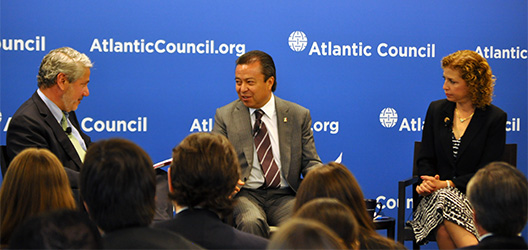
A Conversation with the Chairs of Mexico’s Institutional Revolutionary Party (PRI) & the United States’ Democratic Party
Recent electoral reforms in Mexico are a watershed moment in the country’s full transition to a pluralist, participatory democracy. Reforming the electoral process has been a constant pursuit of opposition parties such as the PAN and the PRD after decades of PRI control. Among the reforms are new institutions to ensure greater accountability and transparency across national and local elections; a statutory possibility for coalition governments; and the ability of members of Congress to run for re-election and as independent candidates.
The United States is also at a moment where our political processes, such as campaign finance and voter rights are very much in the spotlight. What can these two national learn from one another? In an attempt to answer this question, The Adrienne Arsht Latin America Center, in partnership with the Wilson Center’s Mexico Institute held an event with two of the most prominent political party representatives in their respective countries: The Honorable Dr. César Camacho, President of the Institutional Revolutionary Party (PRI) of Mexico, and the Honorable Debbie Wasserman Schultz, US Representative of Florida’s 23rd Congressional District and Chair of the Democratic National Institute.
The conversation centered around the future of political parties and their role in moving forward the political process. Both Dr. Camacho and Congresswoman Schultz discussed the importance of ongoing electoral transformation in the US and Mexico, and also engaged in different ideas about transparency, issues of inclusion, and changes in the national political processes in both countries.
